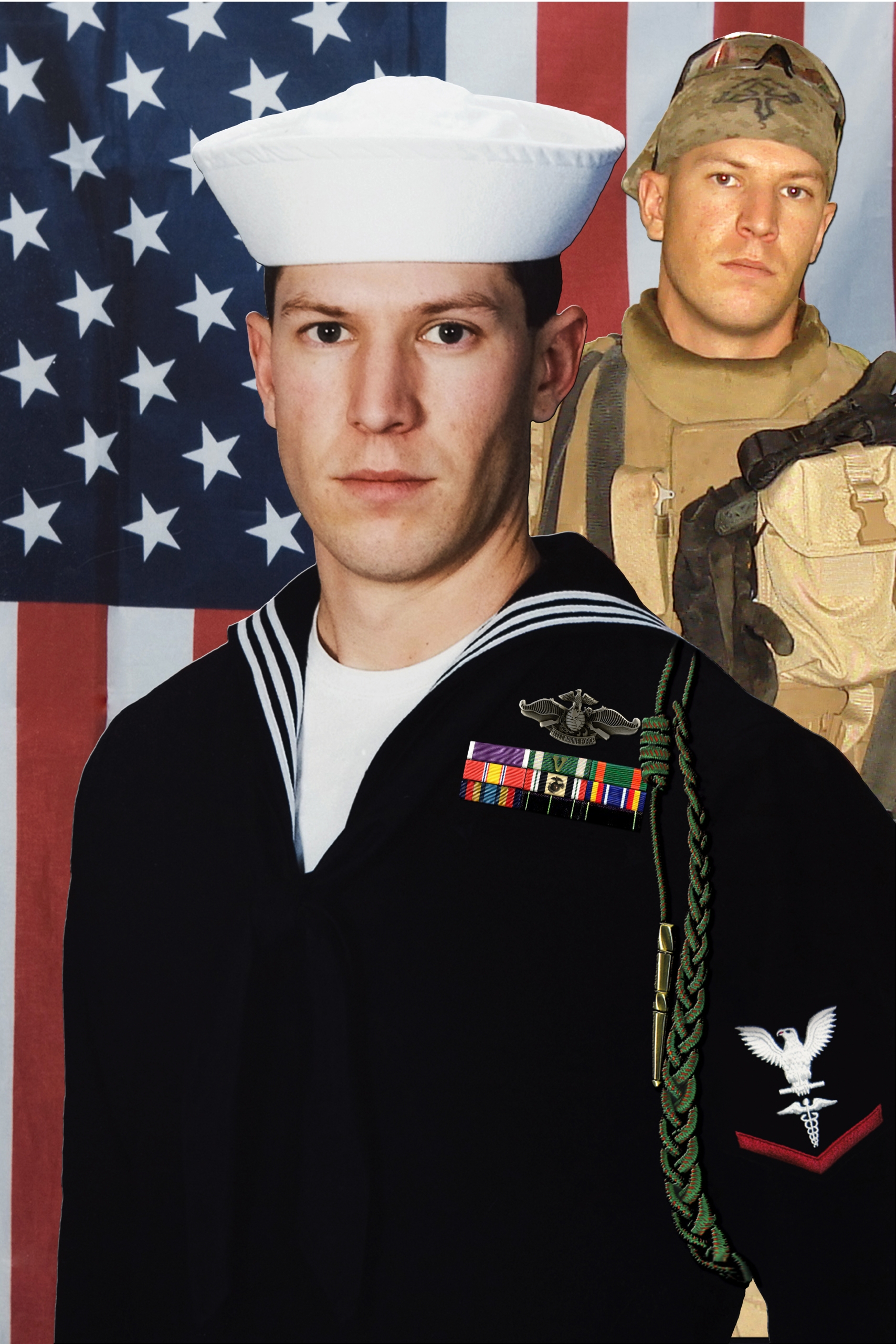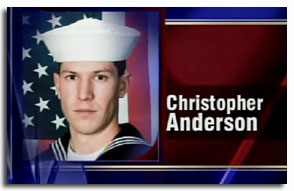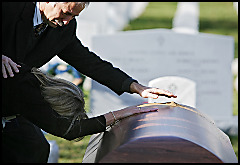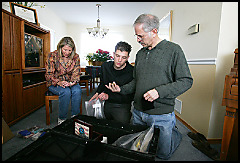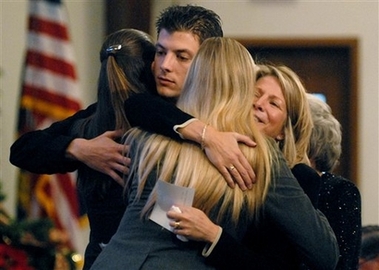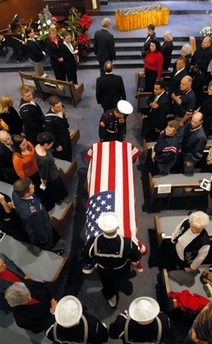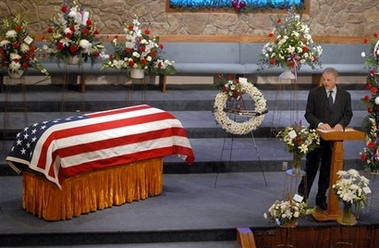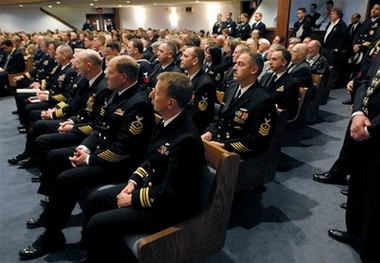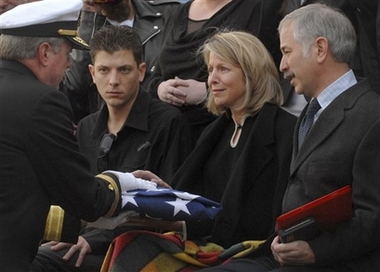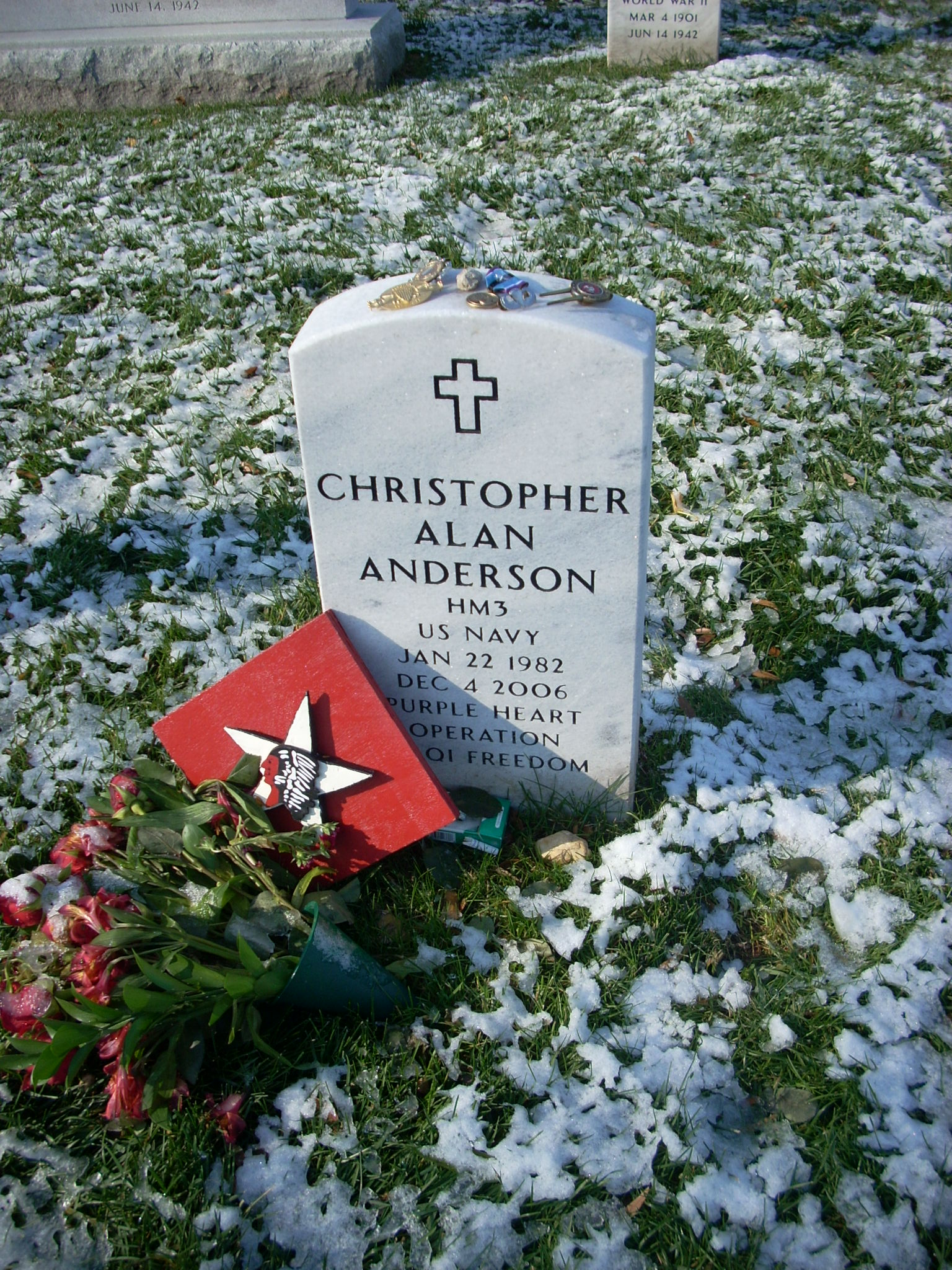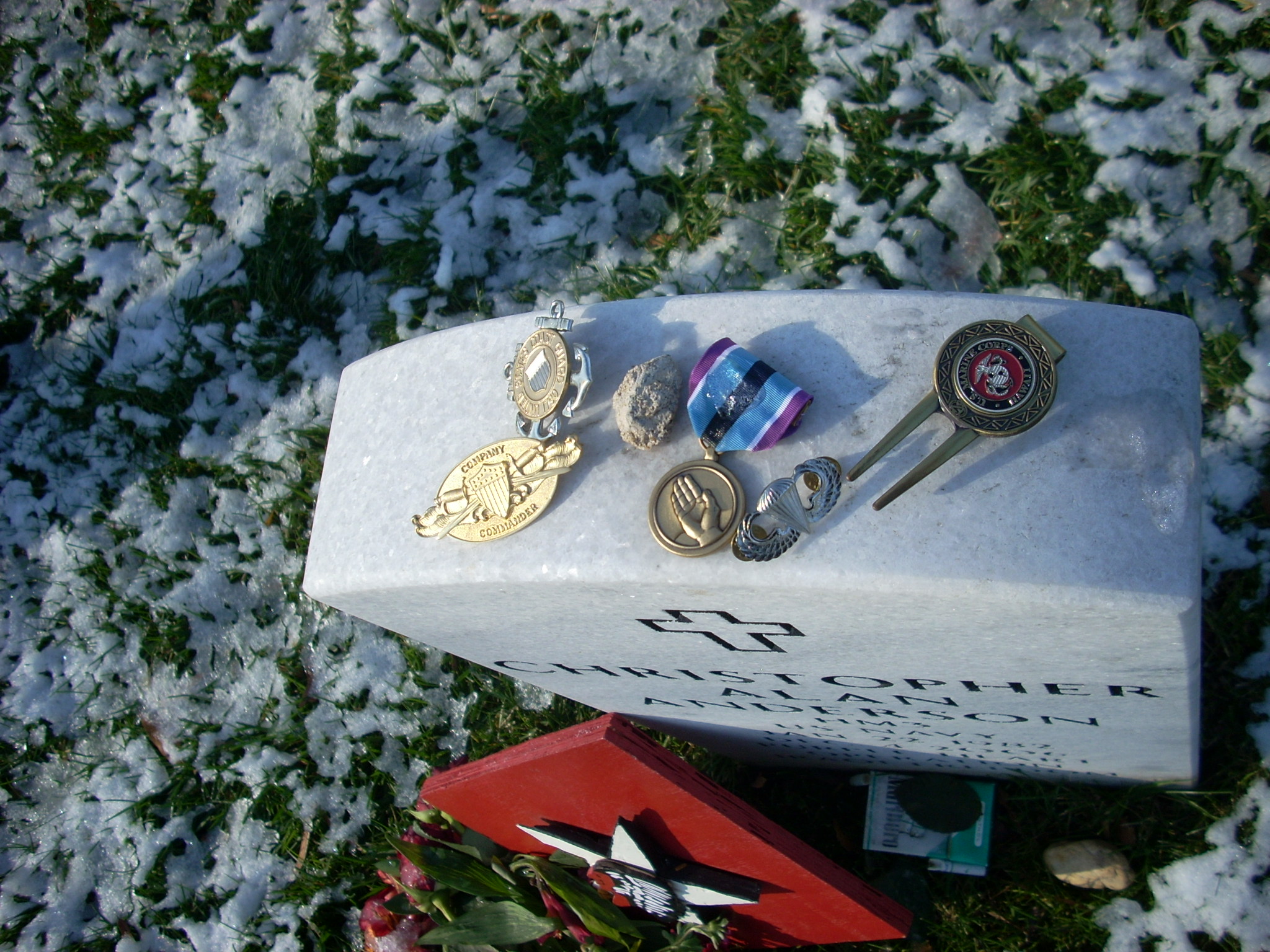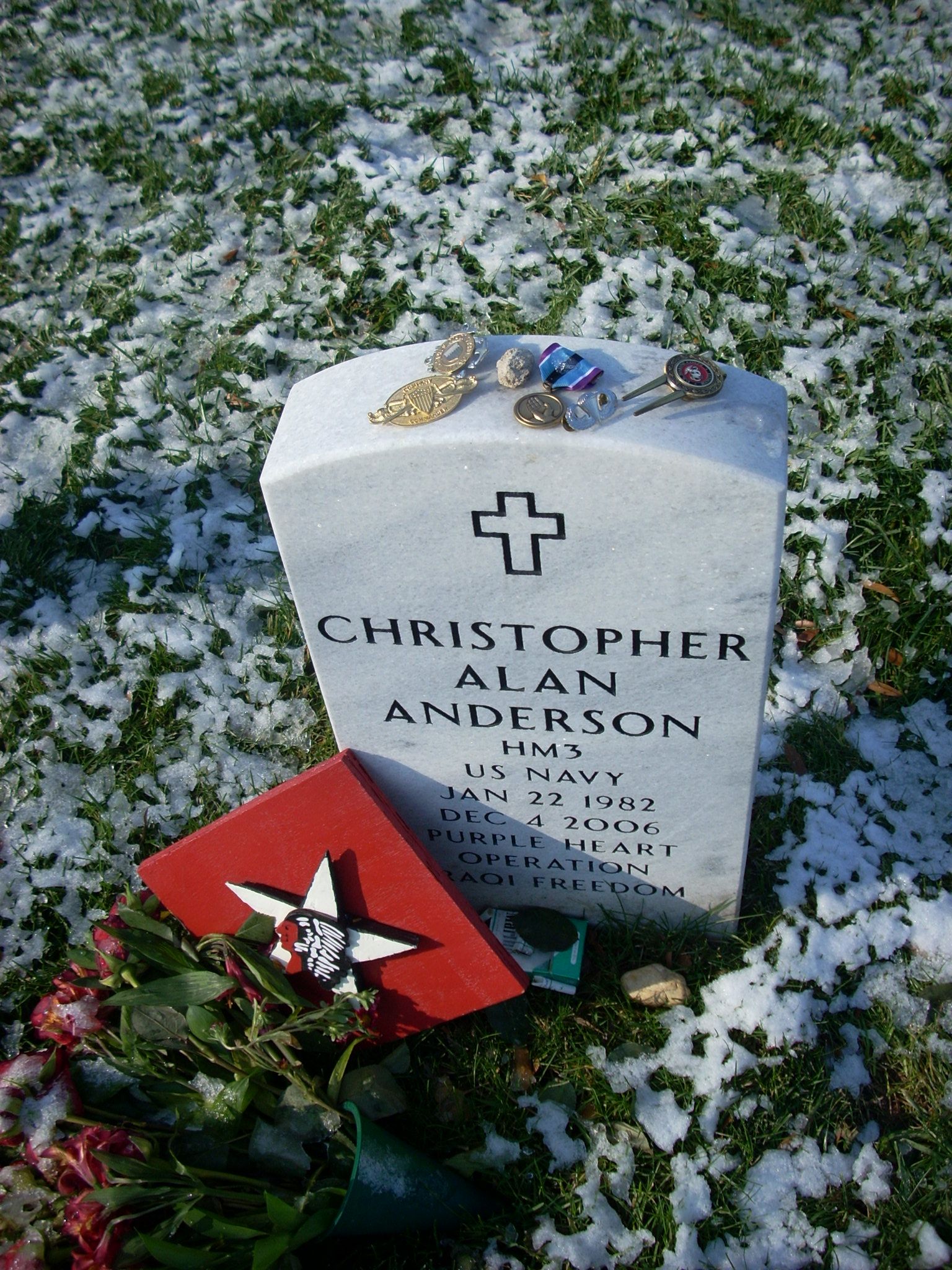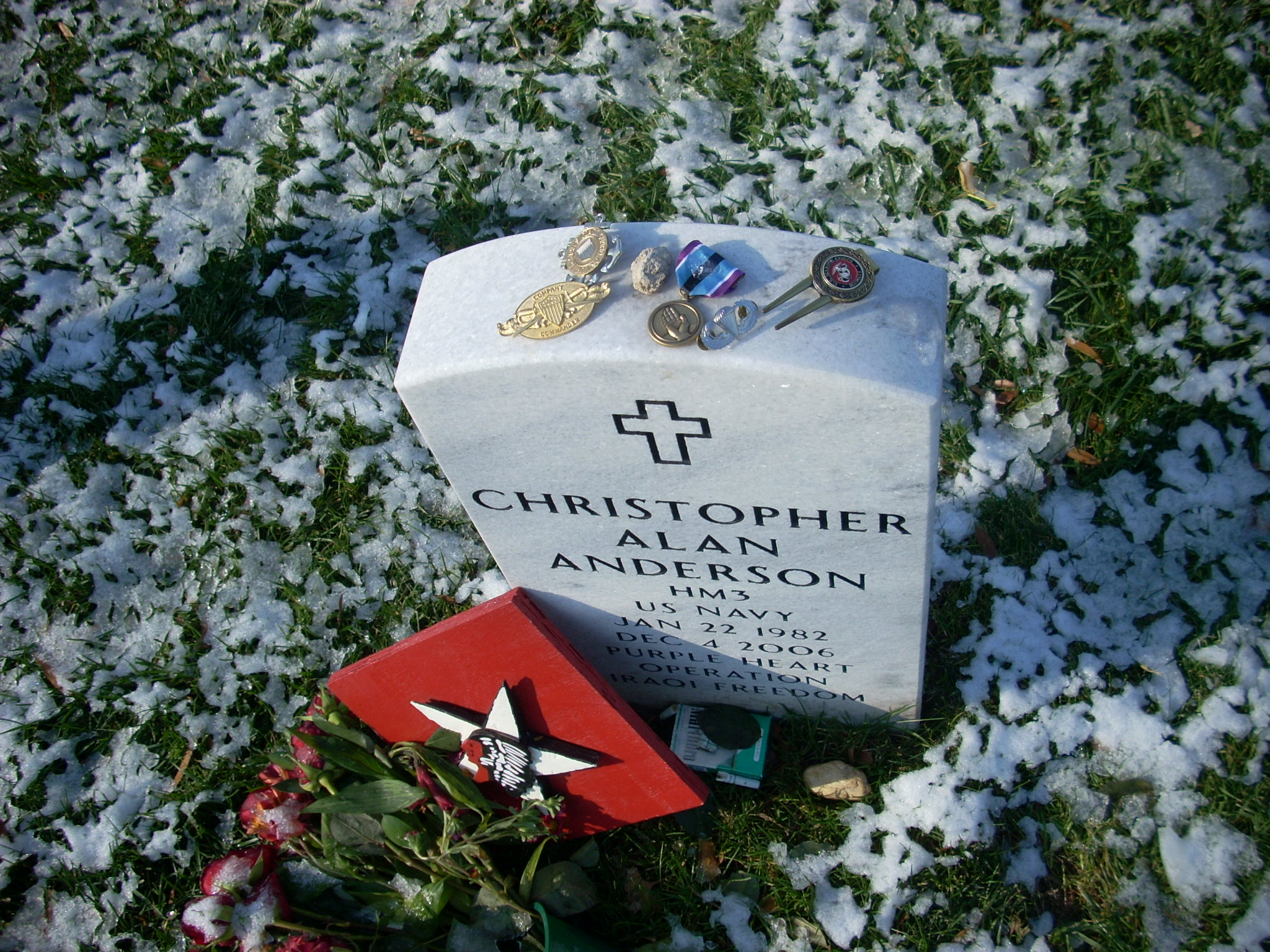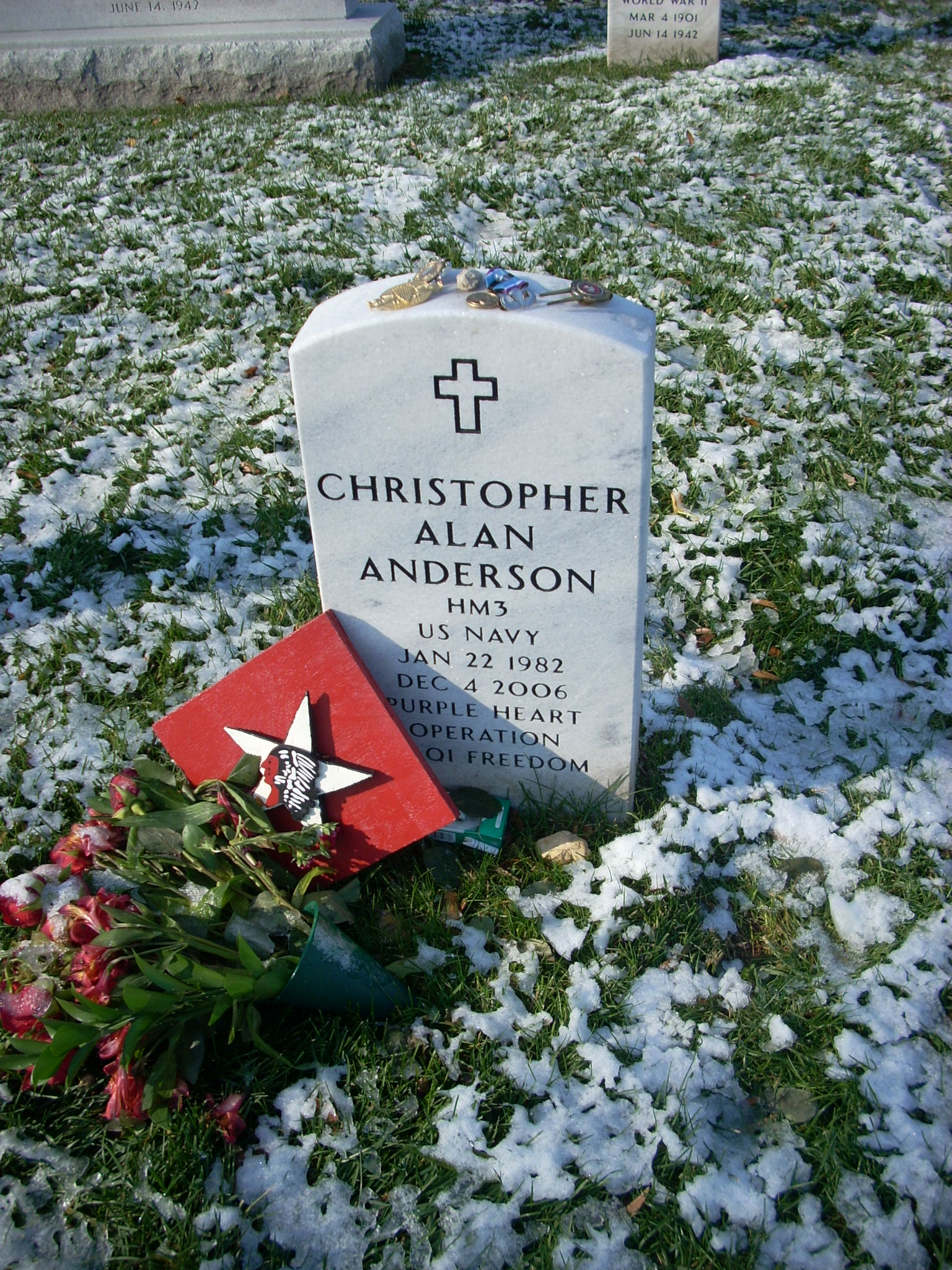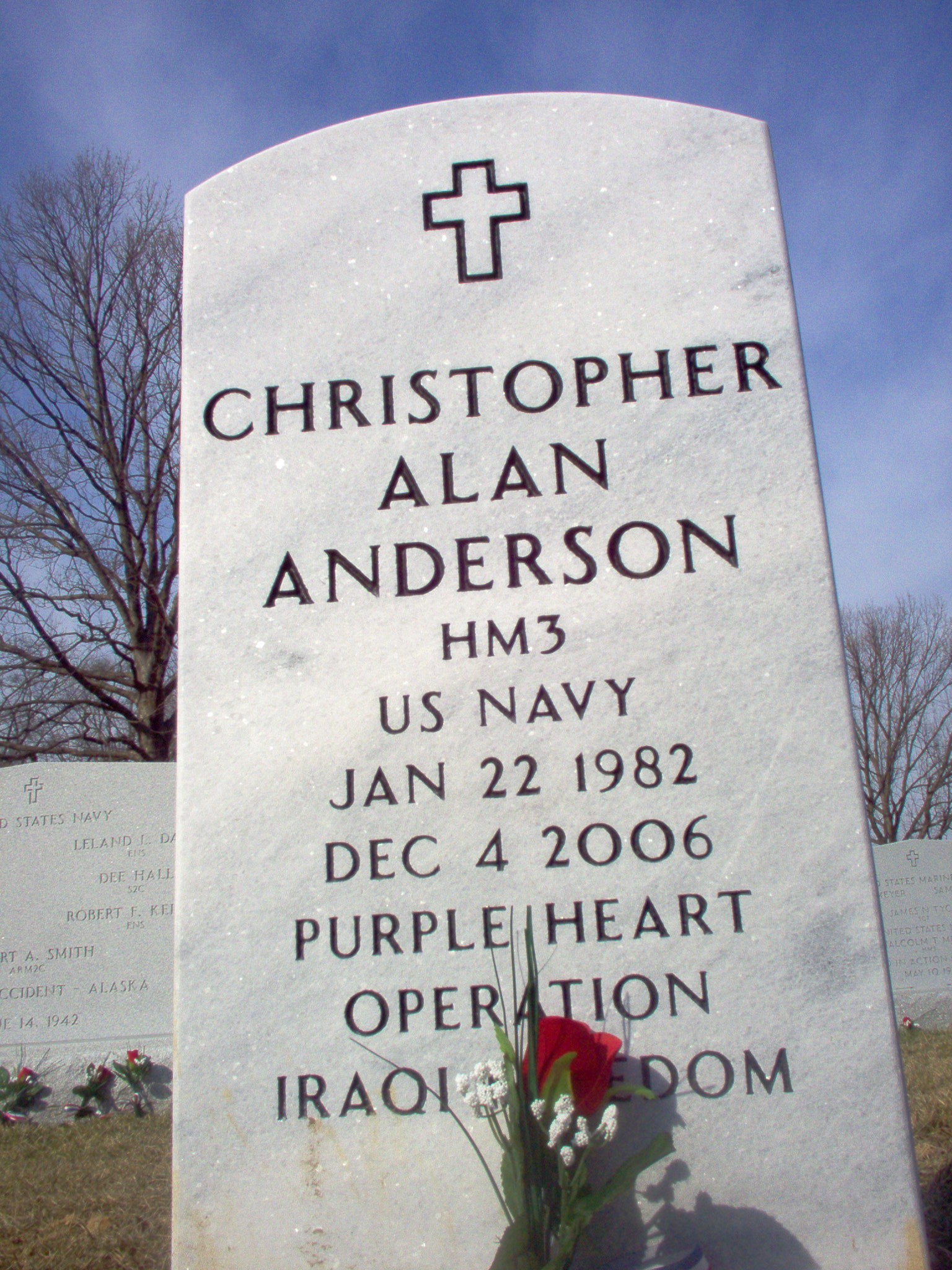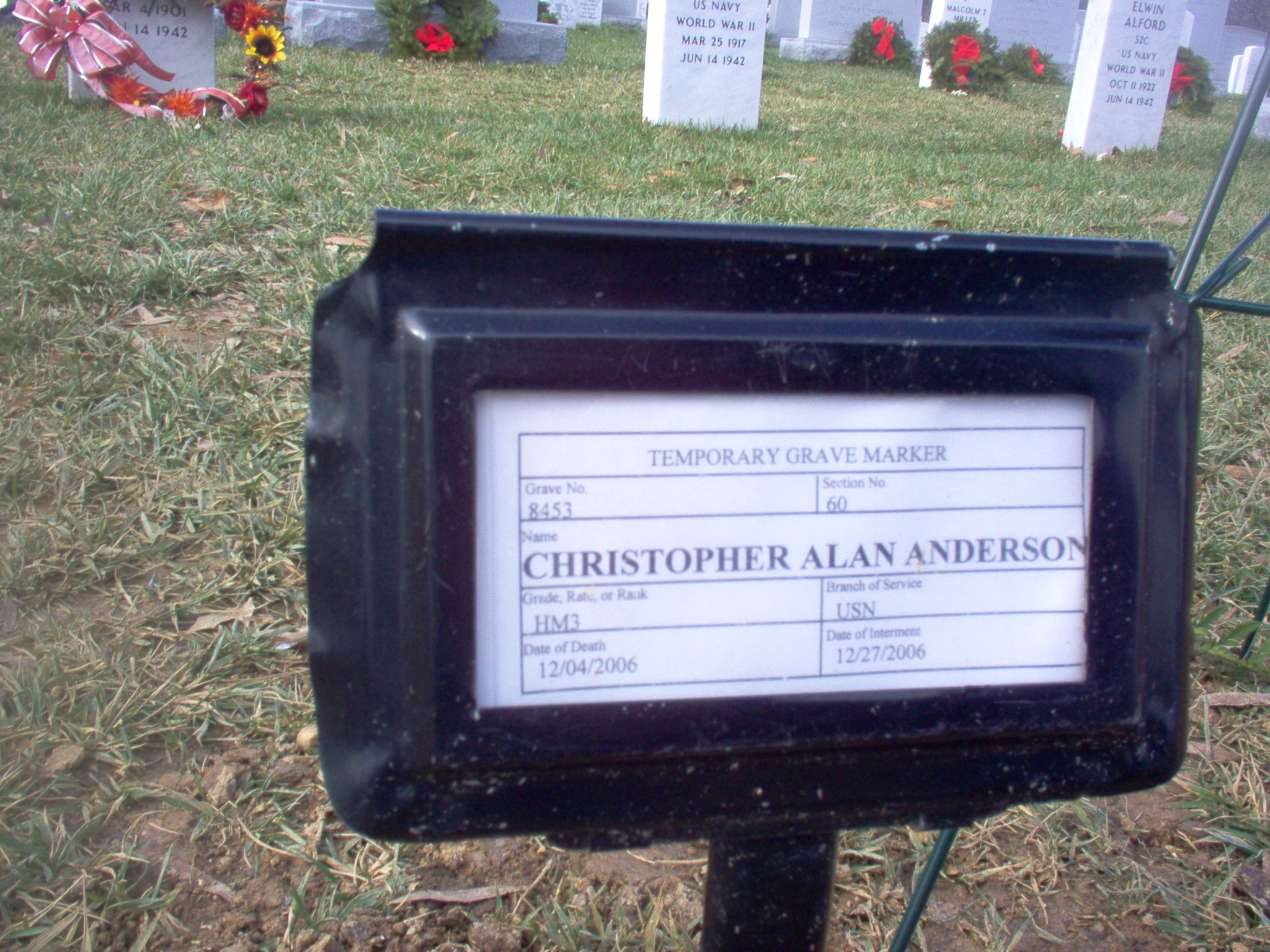NEWS RELEASES from the United States Department of Defense
No. 1240-06 IMMEDIATE RELEASE
December 6, 2006
DoD Identifies Navy Casualty
The Department of Defense announced today the death of a sailor who was supporting Operation Iraqi Freedom.
Hospitalman Christopher A. Anderson, 24, of Longmont, Colorado, died December 4, 2006, as a result of enemy action in Al Anbar Province, Iraq.Anderson was a Navy Corpsman assigned to 1st Battalion, 6th Marines, 2nd Marine Division, Fleet Marine Force, Atlantic, based in Camp Lejeune, North Carolina.
For further information related to this release, contact Navy Public Affairs at (703) 697-5342.
Corpsman from Colorado is killed in action in Iraq
December 7, 2006
A Colorado sailor was killed in Iraq on Monday. Christopher A. Anderson, 24, of Longmont died during military action in Anbar province.
He was a Navy corpsman who was assigned to the 1st Battalion, 6th Marines, 2nd Marine Division, Fleet Marine Force, Atlantic, based at Camp Lejeune, North Carolina.
Calls to the family and to the Navy were not returned Wednesday.
However, Rick Anderson, Christopher’s father and a career Navy SEAL, told CBS 4 News that his son was “serving his community, serving his country and serving his family” at the time of his death, and that his son had been approved to be buried at Arlington National Cemetery.
Christopher Anderson joined the Navy on August 9, 2005, and had reported to his unit in May of this year, according to his father.
Brian Van Ness, 49, a next-door neighbor, recalled that Anderson would mow the lawn for neighbors and help out with other chores.
“He always was getting involved with helping neighbors out,” Van Ness said.
Van Ness said Christopher had wanted to join the Navy right after the tragedy of September 11, 2001.
“He was real excited to join the military but didn’t get in right then,” he said.
Christopher worked in construction before he finally enlisted last year. Van Ness said the neighborhood threw a going-away party for Christopher when he was about to leave for boot camp last year.
“The way he described it – he was going to be the head of a medical group and he was pretty proud of himself for landing that,” he said.
Van Ness said he didn’t have any contact with Christopher after the party, but he said Christopher knew full well the dangers of military service.
“He was a real bright kid – he knew what he was getting into,” he said. “He wouldn’t jump into anything.”
Rick Anderson told CBS4 that Christopher was the type of person who wanted to be in middle of the action and not stay back.
A graduate of Longmont High School in 2000, Christopher Anderson was a member of the school’s Fellowship of Christian Athletes, according to John Poynton, spokesman for the St. Vrain Valley School District.
“The students and staff of Longmont High School and the entire district send our heartfelt condolences to the Anderson family,” Poynton said. “He died serving his nation and we’re proud of him.”
Bringing ‘Doc’ home
Chris Schneider
Courtesy of the Rocky Mountain News
15 December 2006
3:44 p.m. Navy Hospital Corpsman John Dragneff, a baby-faced sailor at 22, cries as he watches the casket of his friend Navy Hospital Corpsman Christopher A. Anderson, of Longmont, as it is loaded onto a United Airlines jet in Philadelphia on Tuesday. As Dragneff waited, a woman from the airline, her neck jingling with security badges, walked over and motioned for him to follow. She saw the nervous look in the sailor’s face, and stopped. “Wait,” she said. “Is this your first time doing this?” “Yes ma’am,” he said, his voice cracking. “Well, unfortunately, it’s not the first time for me,” she said, “Not even the first time this week.”
The skinny sailor sat in the Philadelphia airport terminal in his deep blue dress uniform, cracking his knuckles, shifting in his seat, waiting for his best friend.
A woman from the airline walked over and motioned for him to follow. She saw the nervous look on the sailor’s face, and stopped.
“Wait,” she said. “Is this your first time doing this?”
“Yes ma’am,” the 22 year-old said, his voice cracking.
“Well, unfortunately it’s not the first time for me,” she said. “Not even the first time this week.”
She led him toward the gate, and gave him a soft smile.
“You’ll do fine,” she said.
Inside the airport, the P.A. system pumped out Peggy Lee’s “Rockin’ Around the Christmas Tree.” A nearby group of passengers loaded up their ski clothes, readying for a vacation. Suit-and-tied businessmen with premier privileges watched as the sailor was led in front of them all.
None of them knew his mission.
Onboard the nearly empty plane, a flight attendant was one of the first to shake his hand.
“I understand you’re escorting today,” he said. “Is this the fella from Longmont? I live in Boulder. I’ve been reading about him in the papers.”
“Yes sir,” the sailor said in a warbly voice that sounded like an 8th-grader.
“I’m sure you’ll do yourself and your service proud,” the flight attendant said.
After speaking with the crew, the pilot walked over and offered his hand.
“I understand he was your friend,” the captain said. “I’m sorry.”
The sailor nodded. He carried his soft white hat in his hands. The patch on his left shoulder signified his status as a Navy hospital corpsman.
The captain then looked at one of the crewmembers.
“Are there any seats in first class? I’d like to bring him up here.”
After the sailor stowed his bags, the woman from the terminal walked him back out to the jetway, where he waited as the other passengers boarded the plane. As they filed past, some stole glances at him, some smiled at him, and he tried to smile back.
As the sailor waited, another flight attendant, a Vietnam veteran, walked over.
“Hello,” he said, grasping the sailor’s hand. “Thirty years ago they didn’t say thank you to us. I wanted to say thank you now.”
The sailor nodded again, and managed a grin. Then the chief of the ground crew opened the door to the stairs that led to the tarmac.
“OK,” he said. “We’re ready.”
Underneath whining jet engines near the rear cargo hold, baggage workers lifted the tarp on a cart, and the sailor swallowed hard. He checked to see if the name on the cardboard box matched that of his best friend.
The American flag was printed atop the box, which encased the polished hardwood casket, protecting it during transit from Dover Air Force Base to the airport, and then to Denver, where the box would be removed before anyone saw it. On each end, the box was stamped with a large official seal of the Department of Defense.
The last time Hospital Corpsman 3rd Class John Dragneff saw his friend was the same day Hospital Corpsman Christopher Anderson left for Iraq. They talked endlessly that day, about taking care of each others’ families, about taking care in general. That was, after all, what they had in common.
Often in restaurants, the waitperson would ask the sailors, “Are you brothers?” The first few times they laughed it off. After a while, they started answering, without hesitation, “Yes.”
The two young men had met at field medical training school, and clicked right away. They soon studied together, went to the beach, where Anderson surfed, and just generally hung out, talking about where life was headed for both of them.
More recently, they spent time talking about what it meant to hold somebody’s life in your hands — and to lose it.
Monday afternoon, the young sailor stood on the chilly tarmac in Philadelphia. As the casket made its way up the conveyor belt, he snapped to attention, grasping his hands into fists, thumbs at the seams of his pants, trying to squeeze back the tears.
His eyes emptied as he brought his hand to his face in a salute, which he tried to hold steady until the casket disappeared into the plane’s belly.
As he turned, the sailor’s face melted, and he walked into the embrace of Pamela Andrus, the United Airlines service director. The ground manager took his other side, supporting him.
“I’m so sorry,” Andrus said.
Together, they walked back up the stairs, into the plane, where a cheery flight attendant came over with several tissues plucked from the lavatory.
“You can cry,” Christine Sullivan told him. “All of us want to send our love and blessings to you, and be here for you.
“You’re going to do great.”
On December 4, Chief Hospital Corpsman Kip Poggemeyer wasn’t supposed to be in his office at Buckley Air Force Base in Aurora. It was his day off, but the 37 year-old was busy trying to finish medical reports that would send another batch of Navy reservists from Colorado to Afghanistan.
Only last year the Navy Corpsman had returned from Marine Corps Air Station Al Asad in Iraq, the closest medical base to some of the heaviest fighting in the country — a base that shook with mortar attacks 26 times during his deployment.
Within his first week, he saw massive combat wounds while performing the same job his grandfather held during World War II, the same job he knew he wanted since he was a little boy.
The history of the Navy Hospital Corpsman dates back to the Spanish American War. The Marines needed a field medic, and looked to the Navy to provide one.
According to Navy Historian and Hospital Corpsman Mark Hacala, the Navy Hospital Corpsman has provided the front line medical care that has saved countless lives on the battlefields of every conflict since, earning a disproportionate share of accolades and awards, and suffering a similarly massive percentage of casualties.
Despite both services living under the umbrella of the Navy, Marines and sailors hold an intense traditional rivalry. When new hospital corpsmen are assigned to Marine units, the Marines may tease them as “squids” or worse. Still, the hospital corpsmen have to learn to think, act, and react with the speed of their Marine unit.
When a hospital corpsman is first attached to a unit, the Marines will call them by their last name, or maybe just “corpsman.” Eventually — only when corpsmen earn the Marines’ respect — they earn the nickname “Doc.”
“The first time they call you ‘Doc,’ it’s like, ‘Yes! I have arrived,’” Poggemeyer said. “It makes you feel like you’re part of the team.”
Once the fighting begins, the Corpsman’s duty is usually one of the riskiest — carrying their own weapon along with medical gear.
The Marines say they will take a bullet for the Corpsman, because he’s the only one who can take it out.
“If they yell ‘Corpsman up,’ they know Doc is going to be right there,” Poggemeyer said. “When the Marines call you ‘Doc,’ you know you’ll never let them down, you’ll never leave their side. That bond between a Marine and a Navy Corpsman is something that will last forever. We call them ‘My Marines,’ they call us ‘My Doc.’”
Somewhere near Ramadi on December 4, 2006, Christopher Anderson’s Marines called on their Doc. Details of the attack have not been released by the military, other than the information Poggemeyer received in his office that afternoon.
“They told me it was a corpsman, K.I.A. in Ramadi from a mortar attack … It brought back all the memories,” he said. “I had come full circle. I was in Iraq and saw people die. But I had never seen this side.”
That afternoon, Poggemeyer and another casualty assistance officer met the Navy Chaplain in Longmont. The chief carried with him a sheet with the name of 24 year-old Hospital Corpsman Christopher A. Anderson, and his parents’ address in Longmont.
Together, the sailors drove to the modest home with an American flag flying from the porch, and another special flag in the window.
After they parked the government SUV at about 5:30 p.m., Poggemeyer saw the blue star flag, signifying the family had a loved one overseas.
“Doc Anderson,” it said underneath the star.
“When I saw that, my heart just sank,” he said. “My mom and dad had one of those flags up while I was gone. My wife had one up.”
Still, he made his way to the door.
“I pushed the doorbell,” he said, “and I felt like a horse kicked me in the stomach.”
Debra Anderson opened the door and saw the men in uniform.
“Oh, honey,” she said with a smile, calling to her husband.
“The sailors are here. The recruiters are here.”
Rick Anderson came to the stairs and his face paled. A former Navy SEAL, he recognized the uniforms.
“Honey, we need to sit down,” he said.
“These aren’t recruiters.”
In the first class section of United Airlines Flight 271 from Philadelphia to Denver, the sailor looked through a booklet called MANUAL FOR ESCORTS OF DECEASED NAVAL PERSONNEL.
“It’s weird. I think back, and I was never an emotional-type person until I joined the military,” Dragneff said. “In the past I’ve had relatives who died, but I never really cried. I guess that since I’ve been in, it all means a lot more.”
He thought back to one of the last times he saw his friend, Chris, when they went to visit Arlington National Cemetery on Memorial Day, and he found the grave of a sailor he had trained with.
“When we went out to Arlington, standing there I just started crying, and I couldn’t understand why. I didn’t really know the guy that well,” Dragneff said.
“Chris just grabbed me and hugged me and let me sit there and cry. As we were walking away a man walked up and shook my hand and said, ‘Thank you.’ So then Chris started to cry. So there were just the three of us standing there, crying.
“A few minutes later, just trying to cheer me up, he made up some story about a squirrel on crack. Just like that. He could make you smile.”
Dragneff was the responsible one, relatively shy, the designated driver who didn’t drink or smoke. He was the one happy in a sweatshirt and jeans while Anderson would change clothes five times before going out, a neatnik who splurged on Armani and Ralph Lauren.
At 6-foot-2 inches tall, with short-cropped jet black hair and hazel eyes, the muscular, outgoing kid looked never lacked in self-confidence.
“Damn, I look good,” he wrote on one of the photos of his MySpace.com account. On the website, Dragneff posted regular updates about his friend while he was in Iraq. He was also the one to inform them of Chris’ death.
“Dec 5 2006 12:56P,” he wrote.
“Christopher Anderson, you weren’t a ‘real’ brother, but you were still my brother. A person could not ask for a better friend or brother. You will will be greatly missed. Love your brother, John.
“Rest in peace.”
On the evening of December 4, 2006, Kyle Anderson wound through the remote roads of Weld county, making his regular rounds in his Schwan’s food delivery truck, when he realized he had a message on his cell phone.
“It was my dad, saying that he had a problem and he needed my help, and that he wanted me to come home right away,” he said.
The 22 year-old shook his head.
“My dad is a Navy SEAL. There’s nothing he can’t handle. I knew something was wrong,” Anderson said.
“When I called back, the first thing I said was, ‘Is my brother alive?’ And he said ‘No.’”
He hung up the phone.
On the other end of the line, his parents worried. The notification team offered to go and pick up the young man who was now their only son.
When Kyle called back, his parents asked him to pull over, saying the sailors would meet him to help drive back. He parked his truck at the intersection of I-25 and Highway 66, and waited, crying alone in the dark.
“It was so surreal. I wondered, ‘Is this really happening?’” he said. “As I waited longer, I thought, ‘Maybe they won’t show up. Maybe it’s not real.’”
When the government SUV arrived, Kyle dropped his head.
“It was about 25 degrees outside and we were standing on the side of I-25 telling him about his brother,” Poggemeyer said. “And giving him hugs.”
Once back at the home in Longmont, the family talked to the notification officers about their son, breathing life into the name on the casualty list.
“We spoke to him on Dec. 3,” his father said. “He talked about the Christmas presents he wanted us to buy for a neighbor, and that he wanted us to send out Christmas cards for him.”
At his funeral service today in Longmont, the family plans to hand out their son’s Christmas card to everyone who attends.
He asked that the card end with a single phrase: “Please Remember Our Troops!!!!”
When Christopher Anderson enlisted in the Navy in 2005, the Longmont High School graduate became the fourth generation in his family to do so. At boot camp, he was voted the “honor graduate” in his class. After that, he wanted to excel in everything.
Before he left for Iraq, Christopher and his father mined military supply shops, looking for any equipment that might help him in the field. He looked for anything that might help him blend in with the Marines, since he knew corpsmen were prime targets.
“I have to be able to do this in the dark,” he told his father.
In Iraq, he asked to be stationed with the front-line Marines, and was assigned to a 12-man unit. One of his first tasks was to memorize each Marine’s medical records. His medical expertise stretched beyond his unit, to the Iraqi people, who would talk to him “because he was ‘the dictor’ (as the Iraqis called him). “There were times that nobody would talk to anyone except him,” Rick Anderson said.
Once, he told his parents, an angry crowd had mobilized, but it was quashed when a woman recognized the corpsman, and stepped in.
“She said, ‘This is the one who helped my baby,’” Rick Anderson said, “And that dispersed the group and everything was OK.”
After some of his weekly early-morning calls home, it was impossible for the couple to fall back asleep.
“One time he called us at 5 a,m. My wife heard some funny noises and heard shouts of ‘Where’s that coming from! Where’s that coming from!” Rick Anderson remembered.
The Andersons, still in bed, listening with the phone between them, heard gunfire.
“I’m going to stay down here,” he told them. “I’ll just belly-crawl down the hallway so I can talk to you.”
In one mortar attack, he was blown across a room, bruising him. Not long afterwards, after another attack, he was in the back of a Humvee, his hands covered with his sergeant’s blood, speeding toward a field hospital, tying tourniquets and offering encouragement.
“The sergeant told him, ‘Tell my wife and kids I love them.’ He told him he wouldn’t need to do that while he was pinching off an artery because the tourniquet came loose,” his father said.
That sergeant is now recovering at Walter Reed Army Hospital, the family said, and plans to attend Anderson’s burial at Arlington National Cemetery on December 21, 2006.
Before he left, Christopher and his father talked about the possibility that he wouldn’t return, and he had asked for a burial at Arlington.
He had only one other request:
“If something happens,” he told his father, “I want John there.”
At 31,000 feet, the word slowly slipped through the plane about the sailor in first class, and his mission.
When the passengers found out, their emotions spanned the debate that continues to split the country. Some cursed President Bush by name. Others cursed anyone who says they support the troops without supporting the war. Despite their political leanings, they all said they appreciated the sailor that most of them called “the kid” in the front of the plane — and, even more, the one in the cargo hold beneath them.
Seat 33F, Patrick Mondile, Philadelphia:
“I look at my own situation — I’m 24 years old. I think about it very well could have been me, if I’d chosen that path. I have friends over there right now,” Mondile said. “I don’t understand why we’re there (in Iraq), but I feel for the families — not just for this soldier, but the thousands who have died.”
Seat 14A, Pam Anderson, N.J.:
“God bless him. God bless him,” she said of the sailor in first class. “If he wants any free hugs just send him back here,” the 62 year-old said. “I’m serious. I’m completely serious. I joined the Air Force as a flight nurse, and my squadron is taking a lot of men and women out of the field right now.”
Seats 8D, 8E, Dave and Lindy Powell, Monument:
“To me, it’s a sense of honor. We didn’t know him, but he’s part of the Colorado family. We’re from Monument. So he’s part of our family, too,” Dave Powell said.
“Our nephew is a C-130 pilot who’s flying into Iraq and Afghanistan. Kids in my scout troop joined the Marines and went right to Baghdad.”
His voice broke.
“They all came home safely.”
Seat 22D, Terry Musgrove, Ontario, Ore.: “If we don’t support them then it’s going to embolden the terrorists,” he said, fuming as he spoke about a new poll showing declining support for the war. Before the flight took off, he was the only passenger to shake the skinny sailor’s hand in the terminal.
“It breaks my heart to know that he’s on the plane. I had no idea,” he said, as he began to cry. “But I’m proud to tell you I’m proud.”
Seat 16F, Michael Lipkin, Aspen: “I think it’s extremely sobering. This is a war where few of us have family and friends over there, and despite the fact that it dominates the media, I think most of us don’t feel the cost, the real cost of this war. And we’re going to be paying it for a long time,” Lipkin said.
“I’m just chilled that that body is on here.”
Inside the cabin, flight attendant Christine Sullivan walked back to the coach cabin after visiting with the sailor again.
“It just makes it real,” she said. “It’s separated from politics at this point. It’s just about the humanity.”
As the plane began its initial descent, Captain George Gil’s voice crackled over the intercom.
“Ladies and Gentlemen, pardon the interruption, but if I could have your attention,” he said, and then paused.
“The great song from Francis Scott Key says that to live in the land of the free, it must also be the home of the brave. Today we’re bringing home two brave men: Petty Officer 3rd Class John Dragneff, and, in great sadness, a fallen hero, Hospitalman Christopher Anderson.”
He asked the passengers to let Dragneff off first, to meet the casket, then addressed the escort:
“Please know that our prayers and blessings are with you, and the family. Thank you for your courage.”
As the plane taxied to the gate at Denver International Airport Tuesday evening, the passengers saw the flashing lights of the police cars, the hearse parked on the tarmac, and they spoke in hushed whispers.
As Dragneff left the plane, a phalanx of pallbearers — three Marines and three sailors — walked toward the plane, for the sailor who died saving Marines.
Inside the belly of the plane, ramp workers removed the cardboard box protecting the casket, and sailors arranged the American flag.
The family embraced as the casket was lowered on the conveyor belt. Some of the plane’s passengers watched from their windows. Some watched from the windows inside the terminal.
The pallbearers loaded the casket into the hearse, and Dragneff hugged the family before climbing into the passenger’s seat.
As the motorcade made its way toward Longmont, the three sailors who served as pallbearers jumped in a white van, and pulled in behind the limousines.
As they left the airport, police officers and firemen stood in salutes, bathed in the flashing emergency lights.
“This is so cool, that they do this,” said storekeeper 3rd class Ben Engelman. “This is so amazing.”
At the Erie and Dacono exit, fire trucks and paramedics, lights flashing, were parked on the overpass. As the procession turned toward Longmont, the lights burned even brighter.
“He deserves this. He was doing good,” said petty officer Rick Lopez.
On Highway 66, cars pulled over along with firefighters, who continued to salute.
Then there was Longmont’s Main Street.
At 20th and Main, the flags began. Kids holding plastic flags, Korean War Veterans holding worn American flags, bandana-clad Vietnam Veterans holding POW/MIA flags.
At 18th and Main, groups held candles and signs. “God Bless Your Son. Thank You.” A boy held his candle to his mother’s to light it as the hearse passed.
At 17th and Main, hands over hearts. Hats over hearts.
“Dude, this is giving me chicken skin,” Lopez said, then shivered. “I’ve never seen anything like this.”
At 15th and Main people came out of a restaurant to watch the procession. Police cars with blue lights and medical cars with red lights shone on the Christmas decorations wrapping the trees of downtown.
Outside, it was about 40 degrees. Still, the crowds continued to line the streets. More children with wobbly salutes. A woman in a walker. A couple that embraced in a hug as soon as the hearse passed.
They drove in silence for a few minutes, and Lopez spoke again.
“You know,” he said, “Sometimes I wish they would do this for us when we come home alive.”
Inside the funeral home, a few feet from her son’s flag-draped casket, Debra Anderson held tight to a single photo.
“I had to have my picture of my smiling Christopher,” she said, staring at it, then at the casket.
While Christopher was deployed, his parents talked with him at least once a week — mostly for only a few minutes. The last time they spoke, the day before he died, he ended his conversation the way he always did, telling his parents, “I love you.”
“You could hear his smile in his voice, you could hear it on the phone,” his father said. “He was going back to work, back to do his job, back to doing what he wanted to do.”
Inside the funeral home, Debra Anderson leaned into her husband of 26 years, wiping her face with a tissue.
“My boy, my boy,” she said. “Christopher said he’d be OK. He promised he’d be safe, Rick — he PROMISED me. I miss him I miss the phone calls. I miss him terribly. I want to talk to him.”
“Hey,” Rick Anderson said softly, “now we can talk to him anytime we want.”
“Ooooh,” she moaned. “My heart hurts. My heart hurts. It was my job to take care of him. I shouldn’t have let him go. I shouldn’t have let him go.”
“You were going to stop Christopher?” his father asked. “Since when?”
They both managed a smile, and their eyes again fell on the casket.
As the family told Christopher stories from chairs in a corner of the room, Kyle Anderson stood at the foot of the casket, refusing to leave his place, patting his hand on the rough, wrinkled flag.
The brothers had grown up as opposites, Christopher the well-dressed go-getter, Kyle the rebel who shopped at thrift stores. They fought like most brothers fight. Sometimes, they fought worse than most brothers fight.
Since his brother’s death, Kyle now says, they talk all the time.
As the family continued to share stories, sniffling and laughing, Kyle Anderson refused to move from the casket.
“Why don’t you come over here with us?” Rick Anderson asked him. “Why are you standing there all alone?”
Kyle looked at his father, his eyes red, and patted the casket again.
“I’m not alone,” he said.
More than 16 hours after John Dragneff’s day began, the skinny sailor walked into the room, after finishing his final paperwork, and handed Christopher’s parents a condolence card.
“Instead of saying ‘I’m sorry for your loss,’ I wanted to say ‘thank you’ for Christopher,” Rick Anderson read. “We claimed each other as brothers.”
“You did good, John,” Rick Anderson said. “You did good.”
As they sat together in the quiet room dominated by the casket, Debra Anderson grasped the young man’s hand, and looked into his eyes.
“I’m glad you came with him. It’s what he wanted. You did a good job. You got him home,” she said, gripping his hand even tighter.
“Thank you for bringing him home.”
Healer who never fell back laid to rest
Rick Anderson, a former Navy SEAL, comforts his wife, Debra, as they touch the casket of their son,
Christopher, who was killed December 4, 2006 in Iraq. The couple dusted dirt onto the coffin from Christopher’s
favorite baseball team, the San Diego Padres.
By Jim Sheeler
Courtesy of the Rocky Mountain News
December 30, 2006
The Sergeant with no legs sat inside the cemetery, thinking about how this homecoming was supposed to happen.
The 24-year-old Marine had spent the past two months in a hospital bed, grimacing as he devised his own painful physical regimen to strengthen the tender stumps that end just above his knees, hoping to earn his prosthetic legs early. His unit wasn’t supposed to return from Iraq until April, so he figured he had plenty of time to learn how to walk.
“I wanted to walk when they came off the bus to see all of them, but especially ‘Doc,’ ” he said, referring to the last face he saw before everything went dark.
“I wanted to shake his hand and say, ‘Thank you.’ “
Wednesday morning, near the perfect rows of headstones that stretched up and along the hillsides at Arlington National Cemetery, the man in the wheelchair spoke quietly, in a soft Southern drawl.
“To be honest,” he said, “I’m pretty nervous about this.”
“You’ll do fine,” his mother said.
The Sergeant’s body is still riddled with shrapnel wounds, pitting the skin on his entire left side with deep pink scars. What is left of his legs jutted from the wheelchair, filling only a fraction of his jeans, which were folded at the place where his knees used to be. Only one hand works.
He looked over at his wife and two daughters, at his parents and the rows and rows of white marble. Somewhere out there was a fresh grave.
As he entered the place known as “our nation’s most sacred shrine” for the first time, the sergeant said he was unshaken by the seemingly endless headstones. What got to him, he said, are the people left behind to grieve.
“I just think about all the families,” he said, “and the people like myself who had to go into Arlington for this.”
The sergeant’s father wheeled him into a waiting room, where the Marine asked to sit in the corner, out of the way. Soon, the room was filled with crisp Navy uniforms – admirals, chiefs and hospital corpsmen, many of them sporting dress coats jingling with medals.
Then, down the stairs, the Sergeant saw the people who wore no uniforms, the ones who wore only grief.
As it turned out, the man with no legs didn’t need to learn how to walk to welcome home Navy Hospital Corpsman Christopher A. Anderson.
Doc’s family walked over to him.
A choice to ‘go green’
Marine Sgt. Gregory Edwards took his last step October 21, 2006. After six weeks in country, Alpha Company was on patrol in Ramadi, Iraq, conducting house-to-house searches when a hidden explosive detonated. He woke up and saw the hazel eyes he recognized immediately.
The lanky 24-year-old from Longmont wore a patch with two snakes intertwined around a winged staff – the caduceus, the traditional sign of a healer, and the emblem of a Navy corpsman. He was the only one of them in the squad who was not a Marine – the most important one of them all: the one they all called Doc.
Before being deployed, Navy corpsmen say, they have a choice to “go blue,” serving their time on a ship or stateside, or to “go green,” assigned to the Marines.
Christopher “Doc” Anderson volunteered to go green.
Before arriving in Iraq in early September, Anderson was assigned to Alpha Company of the 1st Battalion, 6th Marine Regiment – a group with a decorated history dating to World War I. The rookie corpsman was soon on the front with the infantry, saddled with securing some of the most dangerous neighborhoods in Iraq.
Before the Marines headed to Ramadi, they had to know that the sailor from Colorado with the massive pack of medical gear was the kind of man they could trust with their lives.
Marines don’t train field medics of their own; they rely on Navy hospital corpsmen, as they have for more than a century. A traditional saying holds that a Marine infantryman doesn’t wonder if his corpsman will save his life – he wonders when.
“When you get a new corpsman, he has to prove himself, that he can do the same things the Marines can do,” Edwards said. “When we do PT (physical training), he has to keep up. When we go on our hikes, he has to carry the same gear, plus his medical gear, which must weigh an additional 30 pounds. And he can’t fall back.”
A fourth-generation sailor, Doc Anderson never fell back.
Although relatively scrawny, it didn’t take long for Anderson to prove that he could run as quickly as any of the “grunts,” with the same endurance. He used his height to help shorter guys over walls and fences, following behind, always looking out.
Using his medical equipment as a universal translator – and ice-breaker – he treated Iraqis as well as his own men, forging trust in a place where the word often has no definition. If he saw an Iraqi child with a cut or scrape, he would paste the child with antibacterial cream and bandages and attempt to win his part of the war with Band-Aids.
Among the Marines, he earned frequent smiles, often at his own expense. He was teased endlessly for his trademark bouncy walk – a literal spring in his step – which he swore he didn’t do on purpose. He stocked an endless reserve of bad jokes, the punch lines of which he would laugh at much too loud and much too long, until everyone around was laughing both with him and at him.
“I like to remember the good times with Doc,” Edwards said. “Sometimes he was a complete jackass.”
‘You’re not going to die on me’
One week before the funeral, the sergeant sat outside Walter Reed Army Medical Center and closed his eyes.
“You’re going to have to give me a minute here,” he said.
For weeks, he couldn’t tell the story of what happened that day – he lied when asked about it, saying that he couldn’t remember anything. The problem was he could remember almost everything.
On Oct. 21, his patrol had stopped in front of one of the houses owned by a government official in Ramadi, he said. The sergeant stepped on what he thinks was a mine or a radio-controlled explosive.
“I was unconscious. And when I woke up, the first face I saw was Doc Anderson,” Edwards recounted. “He said, ‘Don’t worry about it sergeant; it’s not that bad.’ “
The sergeant looked up and saw his legs – or what little was left of them. He saw all the blood, looked at his mangled hand and he went into shock.
“Doc kept saying to me, ‘Stay strong. Stay with me, Sergeant Ed,’ ” the sergeant said. “He said, ‘You’re not going to die on me.’ “
The Marines carried Edwards into an Iraqi home, where Anderson began emergency first aid.
“I told him, ‘You take care of my babies.’
“Doc Anderson said, ‘You’re going to take care of your babies. You’re going to be just fine.’ “
“There was a lot of pain, and . . . and . . . “
The sergeant stopped and closed his eyes again.
“Give me a minute,” he said.
Once transferred to a Humvee, Anderson kept working, tying tourniquets with one hand while elevating the Sergeant’s head with another as they sped to the nearest aid station. That’s when Doc started shouting at his patient.
“While we were in the Humvee, I could feel myself slipping away, wanting to go to sleep, and Doc started yelling at me,” Edwards said. “I was ready to enter whatever afterlife there is, and he kept yelling at me, telling me it was going to be OK.”
Anderson later would tell his friends and parents that it was the most terrifying day of his life – that he constantly second-guessed himself, wondering if he had done everything he could have and should have. He told his closest friends that he had lost the sergeant’s pulse three times on the way to the clinic but that each time he had managed to bring him back.
More than 30 days later, Edwards woke up at Walter Reed in Washington, D.C. He remembered one voice:
“The last thing I heard was Doc saying, ‘You’re going to be OK.’ “
Prankster got ‘squared away’
One of the highest compliments a service member can bestow on another is to say that he or she is “squared away.”
Squared away means that nobody has to worry when the action starts – someone who is squared away can be counted on, even in the most hectic circumstances, to perform flawlessly.
As a boy, Christopher Anderson hardly fit the term.
A prankster with a Bart Simpsonesque streak, he was a master of mooning his cousins from the car. Along with his brother, Kyle, he drove plenty of schoolteachers to the brink of breakdown.
As he grew older, he could juggle girlfriends like a street busker. A stickler for dressing immaculately, he spent inordinate amounts of time choosing his clothes and was known to change clothes as many times as Cher before going out to a bar.
As a teenager, he worked as a baseball umpire, learning to moderate, keep constant watch and mediate disputes. After graduating from Longmont High School, he worked many jobs – from clothing sales clerk to bar bouncer – but always left one option open.
Three generations of Andersons before him had enlisted in the Navy. His father served as an elite Navy SEAL.
In 2005, he became the fourth. Soon after signing the enlistment papers, he committed himself entirely.
At boot camp, he was voted the “honor graduate” of his company. He then returned to Longmont during Christmas break and spent all of his spare time at the recruiting office, trying to bring as many sailors as possible along with him.
His enthusiasm sparked the interest of Navy Commander Dave Copp, who awarded Anderson the Navy Achievement Medal even before the young sailor entered corpsman training school.
“I remember this kid,” said Navy Chief Darrell Crone, an instructor at Naval Hospital Corps School in Chicago, who oversees the Internet site corpsman.com. “He was decorated with an award before he got to our school. We thought, ‘What the hell is this – what kind of brown-noser is this?’ “
After a couple of phone calls, he found out.
“He wasn’t a brown-noser of any kind,” Crone said. “When he was on leave, he was actually recruiting. Normally when kids go home, they lie on the couch and play video games. He was out there doing the job. He was the kind of guy who, if there was a nook or cranny to get things done, he could just do it.”
After Anderson’s death, his father received a call from his son’s commanding officer, who told a story of the first time he saw Christopher in Iraq. The lieutenant colonel remembered pointing to the only serviceman there who wasn’t a Marine and asking about him.
“The master sergeant looked up and said, ‘Oh, that’s one of our docs, Anderson. He’s the most squared-away Marine we’ve got,’ ” Rick Anderson said. “And that was Christopher – squared away.”
Sacrificing for kids ‘like mine’
Last week, inside Ward 58 at Walter Reed Army Medical Center, the Sergeant shook out a Marlboro Red. These days, despite what the doctors say, even his mother won’t give him grief about smoking.
“I figure he survived that,” Cheryl Edwards said, nodding toward his legs. “He can have a cigarette.”
After 36 surgeries, much of the shrapnel remains inside. The sharp chunks of metal will work their way out during the next several years, as his body expels the war.
Edwards’ left hand was shattered in the blast, the bones pulverized “like powder,” he says. The hand is now a gnarled brown mess of dead, flaky skin and giant Frankenstein stitches that wrap around the fingers that have been reattached and secured with surgical pins. He can move his thumb and forefinger like a crab pincer, but he lost some of his knuckles, so his other fingers are shorter than they were. At one point, surgeons suggested amputating some fingers to save his hand.
“The doctor came in and said, ‘How attached are you to that index finger?’ ” Edwards said. “I told him, ‘I’m attached to all my body parts. I’ve already lost enough.’ “
The stumps of his legs are discolored patchwork quilts of skin grafts. One leg was rebuilt with the thigh muscle from a donor body; it now ends several inches above his knee. The other was amputated through the kneecap.
On his head, a bandage covers a quarter-sized dark red hole, which otherwise remains framed in the “high and tight” Marine haircut.
Outside the hospital 10 days ago, a man in a camouflage uniform paused at Edwards’ wheelchair and offered his hand in thanks.
“I get that a lot,” he said after the man left, pulling out another cigarette. “But me, personally, I don’t think I need to be thanked for my service. I chose this. I know that being blown up or dying is one of the hazards of my job. If you don’t expect to get hurt as a Marine infantryman, you’re in the wrong line of work.”
This was his third tour in Iraq. He went in on the initial invasion and saw the statue of Saddam Hussein fall. During his second tour, he was nearly electrocuted and spent time at Walter Reed recovering. Although he is a living example of the war’s cost, he prefers to look back on what he says will be lasting benefits of his sacrifice.
“I lost my legs not for this country, but for the country of Iraq, so their children will be able to run around, just like mine,” he said as he watched his daughters, ages 3 and 5, playing on the hospital grounds. “If time was turned back, I’d do it all over again.”
He says he told the same thing to President Bush last week. Before leaving for Texas for Christmas vacation, the president and first lady made rounds at Walter Reed, speaking to many of the wounded.
Edwards’ mother said that the president, after visiting with Edwards for about half an hour, spoke to other injured service members then returned to the sergeant’s room.
“(The president) said, ‘Some of the guys have cussed me out. Some said they hated me. But I’m going to quote you word for word in my next speech,’ ” Cheryl Edwards recounted.
“He said, ‘I’m going to quote you,’ ” the Sergeant said. ” ‘You just watch.’ “
Outside Walter Reed, Edwards’ girls ran back to him, and he boosted Paige into his lap.
The girls call the stumps of his legs “Daddy’s boo-boo.”
Memorial Day never ends
At Arlington National Cemetery, the American flag flies at half-staff every weekday, as an average of 25 funeral processions a day amble near it, past the white rows of marble, where privates and unknown Civil War veterans lie near Medal of Honor winners and presidents. Arlington is where Memorial Day officially began, the place where it never ends.
The cemetery holds the remains of more than 300,000 men and women on more than 600 acres. According to the Department of Defense, the cemetery recently acquired more land, which should keep it available for burials until 2060.
That is, if the current rate of burials holds.
In section 60, the place where they bury soldiers from the latest war, the headstones are still fresh.
The first of those tombstones is for another man from Colorado, the first casualty from the Iraq War buried at Arlington: Russell Rippetoe, of Broomfield. Not far away lies Lieutenant Colonel Ian Weikel, of Colorado Springs, who was killed in Iraq in April.
In between are several men who were stationed at Fort Carson – Lieutenant Colonel Eric Kruger, Chief Warrant Officer Dennis P. Hay, Sergeant Neil Armstrong Prince and Specialist Hoby Bradfield.
Since September 11, 2001, a total of 21 Navy corpsmen have died in Iraq and three have died in Afghanistan, making up more than one-third of the total Navy casualties.
Not far from the cemetery, the massive Iwo Jima memorial towers over an intersection, honoring the Marines who raised the flag over Mount Suribachi during World War II. Although it is considered a Marine memorial, one of the men immortalized 32 feet tall in heavy bronze is John “Doc” Bradley, the unit’s corpsman.
At the beginning of World War II, corpsmen and Army medics wore red crosses on their uniforms. That stopped when the enemy began using the crosses as targets, knowing that the servicemen would do anything to save their medics. These days, the corpsmen wear the Marines’ digital camouflage while in combat zones and carry full weaponry.
Still, as the tombstones reflect, they remain primary targets.
At Arlington, visitors can buy a $6 ticket for a “Tourmobile” that whisks them through the cemetery in 30 minutes – a tour that pauses at the eternal flame of President Kennedy, the Tomb of the Unknowns and the home once owned by Robert E. Lee, back when the cemetery was a plantation.
The Tourmobile doesn’t go near section 60.
Across the street, the ground is empty. There, workers are preparing section 61.
The unspoken bond
Back inside Walter Reed, Edwards grimaced.
He lives every minute with pain that would make most people wince, so when his face contorts in pain during physical therapy, it nearly shakes the hospital table.
“I’m not a very good patient,” he said. “I have no patience.”
Nearby, men with new computerized legs ran on treadmills, while others tried out their new arms. In a corner of the room last week, two little girls and a young boy watched How the Grinch Stole Christmas, oblivious to their parents’ trying to figure out their new limbs.
After he awoke in the hospital, Edwards asked not to see his own two girls.
“It’s not that I didn’t want to see them,” he said. “But I didn’t want them to see me.”
When he first heard that his Doc died December 4, 2006 from a mortar attack, he asked his wife and kids to leave the room.
“My dad stayed with me,” he said. “For two days, I was heavily depressed. I was heavily medicated. It took me two days to cope with it without being medicated. Now that the funeral is close, I’m starting to have a hard time with it again.”
Last week was the first time he spent a night alone – sometimes, while asleep, his arms will flail and his body will thrash with the inevitable nightmares, so family members take turns watching him, making sure someone is there to wake him from battle.
Only a week before, the commandant of the Marine Corps met with Edwards at the National Naval Medical Center in Bethesda, Maryland.
In the center of the lobby is an enormous bronze statue of a Navy hospital corpsman carrying a wounded Marine, as the injured man’s legs drag the ground.
Now, Edwards said, he plans to send his Purple Heart to the Anderson family.
“It’s the only way I can say thank you,” he said. “I can’t put it into words, what a corpsman means to his Marines.”
He thought back to that bronze memorial.
“It says it all in that statue,” he said. “It’s called The Unspoken Bond.”
‘Daddy will tell you one day’
Wednesday morning, inside a building at Arlington National Cemetery, the Anderson family walked past the Navy officers, directly toward the man in the wheelchair.
Debra Anderson was immediately intercepted by another mother.
“Your son saved my son’s life,” Cheryl Edwards said through sobs, locking Debra in a hug. “I thank you. I thank you so much. And I’m sorry. So sorry.”
The women hugged, then the men did the same, thumping each other on the back.
“He saved our son’s life,” Cheryl Edwards repeated.
Together, the families walked to Sergeant Edwards, who sat with his 3-year-old daughter, Paige, in his lap, and 5-year-old Caitlin and his wife, Christina, by his side.
“I’m so glad you’re here,” Debra Anderson said.
“I wouldn’t have missed it for the world,” he said quietly. “I didn’t give them a choice at the hospital. I told them I had to come.”
“I know Christopher was so worried about you,” Debra Anderson said. “He was so worried.”
“He did everything right. Be proud of him,” the sergeant said. “If it wasn’t for him, I wouldn’t be here. I wouldn’t be able to hold my daughter on my lap.”
Rick Anderson then bent down in a deep hug. With the knuckle of one finger, he brushed the hand of one of the girls and smiled.
“Your boy kept me alive,” Edwards said. “I wanted to let go, and he kept me alive.”
Kyle Anderson approached Edwards and during a long embrace told the Marine that he now carried part of his brother with him. Kyle told the sergeant he always would consider Edwards his brother, too.
Edwards looked up at Anderson’s parents.
“If there’s anything I can ever do for you, you let me know,” he said.
“You just take care of these girls,” Debra said, offering one of the largest smiles that many family members have seen since her son was killed.
“We want to watch these girls grow up,” she said.
From her father’s lap, Paige pointed at Christopher Anderson’s mother.
“Who dat?” the 3-year-old said.
“You’ll understand one day, OK?” her grandmother said.
“Yes,” the sergeant said, stroking her hair. “Daddy will tell you one day.”
‘They all come home’
In section 60 of Arlington National Cemetery, the sun flashed off the bugle of a lone sailor who stood among the thousands of headstones. Dormant trees scratched toward the blue sky, holding dried cherry blossoms that had turned brown.
The burial was supposed to take place last week, but the family was caught in the blizzard and spent the night at Denver International Airport while the sailors rescheduled the burial for Wednesday. The Andersons spent Christmas without their son, without an ending. It had been 23 days since the sailors first rang their doorbell to tell them the news.
The day before Christopher’s funeral, the Department of Defense announced the death of another corpsman – another piece of news that hit hard in the crowd of mourners, which included several families who have sons serving in Alpha Company, still in Iraq.
Earlier in the month, the Siruchek family from New York received a call from their son, a Navy hospital corpsman, who told them that his best friend had been killed. Lots of people called Christopher their best friend.
“Matt asked us to come for him,” Adam Siruchek said. “He said, ‘Since I can’t be there, can you go in my place?’ “
The couple knew they had no choice. They didn’t know how hard it would be.
“The biggest fear in our mind is that it could be us in those chairs (near the casket),” Becky Siruchek said.
“They’re living our worst nightmare, the thing we actually have nightmares about. And they’re going through it.”
As the Anderson family approached the flag-draped casket and took their seats, six sailors surrounded it and lifted the flag.
The chaplain spoke, and the rifle salute cracked.
The lone bugler then began the first few notes of Taps, and Edwards dropped his head, without wiping his tears.
Methodically, the Navy honor guard folded the flag into tight triangles, slapping each fold into another, as if the flag were starched. A rear admiral presented the flag to Debra.
Within 15 minutes, it was over.
Debra’s sister, Sherry McDonald, handed out a bag filled with dark brown dirt, sent from the home field of Chris Anderson’s favorite baseball team, the San Diego Padres.
Each family member took a fistful and dusted it onto the casket. Kyle, imitating his brother as an umpire, spread some of the dirt on his own jacket.
Debra placed her hand on the casket and held it there for several minutes. Slowly, she let go.
The sergeant’s mother walked to Debra Anderson again, and they embraced.
“Greg says he wished it was him,” she said, crying again. “He says he wishes that it was him who came home in the casket instead of Christopher.”
The two women held each other for a long time.
“They all come home,” Debra Anderson finally managed to say, as they hugged on the bright green artificial turf laid out over the mud where another family would soon stand.
“They all come home.”
A father’s salute
After everyone else climbed into their cars and prepared to leave, Rick Anderson stood with Kyle at the gravesite.
The two men put their handprints in the dirt, and smeared it around. -Kyle Anderson didn’t want to leave the casket, and, once again, it fell to his father to convince him to go.
For the past three weeks, Rick Anderson had been the quiet rock, steadying his family, comforting them, looking out for everyone, the way he had taught his son to do, the way his son was doing.
He spoke at his son’s funeral in Longmont and said he cried long and hard during his private, personal conversations with God.
On the outside, with his friendly face and salt-and-pepper moustache, he looked more like the real estate salesman that he is, rather than a former member of one of the most elite special warfare units in the country.
But after all of the quiet, all of the stoicism, Rick Anderson stood at the empty gravesite, took a deep breath and let out a Navy SEAL war cry that carried over the headstones.
“HOOYAH, KID!” he shouted at his son’s casket, his voice breaking.
“YOU DID GOOD.
‘Doc Andy’s’ family finds solace in sifting through hero’s life
Chris Schneider
Courtesy of the Rocky Mountain News
11 January 2007
Christopher Anderson’s mother Debra, brother Kyle and father Rick look through his personal effects after they were delivered to their Longmont home on Wednesday.
“I have the best Marines a Doc could ask for,” they read from the slain Naval corpsman’s journal.
Everyone in the living room could relate to the first sentence scrawled in “Doc” Anderson’s journal.
“Sept. 6, 2006. The shit gets more and more real every minute,” Rick Anderson read, his voice shaking as he held the leather-bound diary.
He looked up at his family, and the heavy plastic boxes that had just arrived from Iraq, and forced himself to continue.
“Everybody’s packed, weapons are drawn – and waiting for the bus. I make my last calls on U.S. soil.”
Rick Anderson stopped and hung his head. “I can’t read this,” he said. “I can listen to it, but I can’t read it.”
The former Navy SEAL walked over to one of the tissue boxes the family has stashed in every room as his son Kyle continued to read.
“We get the call to board the plane. As I walk down the runway I call my mom and dad and tell them I love them and heard the plane. I am nervous – even threw up at one point. Every emotion is flowing.”
“Doc” Anderson’s journal doesn’t last very long – only a few pages. At the same time, the Andersons say, it lasts long enough.
“I have the best Marines a Doc could ask for. Many are 19-20 and married. I am already missing home but I have a new family.”
Nearby, two sailors from Buckley Air Force Base stood near the boxes they had just hefted into the home: Navy Hospital Corpsman Christopher “Doc” Anderson’s last possessions, and his final words.
Wednesday morning, two weeks after they buried their 24-year-old son at Arlington National Cemetery, the family gathered around the first of the boxes and opened the lid.
Inside, everything was inventoried and sealed in zip-locked bags. A bar of soap. A toothbrush. An iPod and dozens of CDs. A package of Charmin To Go. A headlamp and four pairs of sunglasses. A pillow with the faded name, “Doc Anderson.”
“This is his Iraq pillow,” his mother said, squeezing it. “It isn’t very comfortable.”
They continued to dig and found a copy of Flags of Our Fathers and several comic books. They found crayon drawings from kids in the neighborhood, two Bibles with camouflage covers and a miniature version of the Quran.
“There’s probably a great story that goes along with that,” Rick Anderson said, as he slipped the holy book back into the case and laid it near the Bibles.
In one bag, Kyle Anderson found a Zippo lighter, emblazoned with the logo for Operation Iraqi Freedom. On the other side, his brother had scratched, “Doc Andy.”
“This is the last part of my brother coming through this house,” he said a few minutes later, then managed a smile. “The last time all his crap will be scattered across the floor.”
He held his brother’s weatherbeaten camouflage cap in his hand.
“It’s weird because I don’t want any of it. I’m totally happy to have it, but I wish I didn’t,” he said. “I wish I didn’t have to have it.”
Inside a box, someone found a digital camera, and the family beamed. They gathered around the tiny screen, reliving the last few months of Christopher Anderson’s life.
They found photos of him goofing off with “his” Marines, giving candy to Iraqi children, playing baseball. They also saw him in full combat gear, holding his rifle in an occupied Iraqi home.
As she surveyed the remains of her son’s life, Debra Anderson shook her head.
“Christopher was supposed to come home on the bus. This stuff was supposed to come with him on the bus,” she said. “It’s just a hard concept. In my head, I can’t grasp that he’s not coming home.
“Looking at his casket was hard, but this is like, this is it,” she said.
“This is all we have left.”
Geneva card draws tears
At the kitchen table, Rick Anderson picked up a single piece of paper.
REPORT OF CASUALTY, it read.
“This serves as the military death certificate,” said Chief Hospital Corpsman Kip Poggemeyer, as he helped the family navigate their way through piles of paperwork.
A month ago, it was Poggemeyer who rang the Anderson’s doorbell on Frontier Street, starting the process that never seems to end.
Wednesday, Rick Anderson said, was “the last major hump before we start down the path.”
Under “Cause of Death,” the report reads “Hostile action; combat injuries in support of Operation Iraqi Freedom.”
Anderson was killed in a mortar attack near Ramadi on December 4, 2006.
Inside the package, they found more of their son’s medals and two gold pins that were nearly as important.
“These are gold star pins,” Rick Anderson said, as he read the history of the symbol that, for nearly 100 years, represents a family member killed in action. Alongside, he found documents authorizing Rick and Debra to wear the pins.
At the table, they unwrapped black velvet sacks containing the items their son had with him when he died. A Leatherman tool. A sheet with directions for inserting a catheter, and everything from his wallet.
Among the phone cards, credit cards and driver’s license, they found a card with his photo alongside two red crosses.
“That’s his Geneva Conventions card,” Poggemeyer said. “For medical personnel, it shows that you’re noncombative, so if you get taken captive or hostage, they can’t force you to pick up a weapon. They can only have you perform your medical job.
“But Iraq doesn’t really follow the Geneva Conventions.”
The family slowly placed the items back inside the velvet sacks and placed them over the death certificate of the man whose only purpose in Iraq was to save lives.
“It’s weird the things that affect you,” Rick Anderson said as he wiped his eyes. “I can’t think of his Geneva Conventions card without crying.”
Tributes from Doc’s Marines
In early December, a group of Marines from Alpha Company gathered in a room draped with camouflage netting in Iraq, near two “field crosses” – sets of empty boots split by a rifle and topped with a combat helmet, the symbol of a fallen service member.
One Marine approached a makeshift podium and began to speak. The memorial service was captured by video camera and sent to the Anderson family. Tuesday morning, Rick Anderson played it on his computer.
“Men, we gather this evening to honor the service, commitment and friendship we’ve all come to know and share with our fallen brothers here tonight. Lance Corporal Thomas Echols and HN Christopher Anderson,” the unidentified Marine said.
Echols, a 20-year-old Marine from Kentucky, was killed in the same battle on December 4, 2006, that claimed Anderson’s life. As a corpsman, Anderson volunteered to be on the front lines with the Marines, and died alongside them.
“I say brothers because they are brothers,” the Marine continued. “They’re brothers based on the same hardships that create a very special bond between Marines and sailors. Quite honestly, like no other I’ve come to know. I don’t think you can really understand that bond, that brotherhood, unless you’re standing here with us. Unless you’re facing the same hardships, the same dangers, day in and day out.”
At the end of the tape, the members of Doc’s squad gathered to send a message directly to his family.
“Mr. And Mrs. Anderson . . . he was a brother to all of us, loved by us all,” one said.
“He saved my best friend’s life,” said another.
“I want you to know that your son was awesome, and every day we went on patrol, we had his back, and we still do,” said another.
“He was my best friend out here. He was my combat buddy,” said another. “I think about him every day when I get up, and as I get ready to leave that wire he’s with me.
“My prayers go out to you, his family, and I want you to know that his family here misses him more than anything in the world. We miss him, we love him and welcome to our family.”
As the men voice their concern for the family, Rick Anderson said he can’t help but voice his concern for them.
“I’m thinking this guy had to regroup, grab his weapon and go back at it,” he said, after watching the DVD. “When I think I’m having a bad day, I think about the guys who had to go back out there. The young men with my son had to go right back to work.”
“We get to come home and cry,” Debra Anderson said. “They have to go back to work.”
On the DVD, at the end of the funeral service, each man walked to the field crosses.
As they walked past, each man saluted.
The last Marines in line kissed their Doc’s empty helmet.
They’re ‘just regular people’
Upstairs, Debra Anderson keeps several cardboard boxes filled with more than 600 letters sent from across the country.
“These are from all the people who have lost children,” she said, lifting a smaller bag from the pile. “I didn’t realize there would be so many.”
She picked up a letter from a man whose son died while on active duty in 2001 – a letter handed to her by a grief-stricken man inside Arlington National Cemetery, the same day they buried their son.
“His face – it looked like his son had died yesterday,” Debra Anderson said. “I looked at Rick and I thought, ‘Are we going to hurt this bad five years from now?’ “
She looked back toward the letters. “I’ve been around the Navy all my life, and thought I knew everything about it,” she said. “I know how to be a Navy wife. I know how to be a Navy mom. So many in my family were in the Navy.
“But no one has ever not come home. I never had any training on how to be the mother of a boy who wasn’t coming home.”
Near the letters are copies of letters from military officials, and one from President Bush, who, in a few hours, would address the nation on the state of the war in Iraq. The family planned to watch, but they refuse to second-guess the president.
“I personally have a great respect and love for President Bush,” Debra Anderson said. “I’m sure it’s been very hard for him to personally sign 3,000 condolence letters.”
Despite her loss, she said, she tries not to think about the politics of the war.
“I don’t have enough information to know if the war is right,” she said. “One time on the phone I asked Christopher, ‘Is this war worth it?’ And he said, ‘I don’t know about the war, but I do know that these people need us here because they can’t protect themselves.”
It was the people, his family says, that he continually spoke of.
“Chris said, ‘They’re just regular people. It’s just like Frontier Street, except so beat up. There are husbands and wives and kids just trying to make it.’ “
The military presence in Iraq continues to hit them. Tuesday, they heard that one of Christopher’s best friends, Navy Corpsman John Dragneff, who escorted Doc Anderson’s body home to Longmont – just received orders to deploy.
“When we found out, we were thinking, ‘Oh no.’ We pretty much adopted him as part of the family, and now he’s going there,” Rick Anderson said.
When Kyle Anderson spoke to Dragneff on Tuesday, he said he would make a deal with the man he also calls his brother.
“Some of these medical bags, I’m going to give them to John, but only on loan,” he said, holding up one of his brother’s backpacks. “The one condition is that he has to return them in person.”
As she continued to sift through the letters, Debra Anderson shook her head. “They all call him a hero. A hero,” she said. “As a mother, I see my son in a lot of ways, but I gotta say I still can’t grasp that word.”
A final letter comes home
Inside the boxes rested one last surprise.
“Dad, here’s a letter to you,” Kyle Anderson said, holding up two pages in his brother’s handwriting.
The letter is dated Nov. 27, one week before Christopher Anderson’s death.
“What up old man, I mean Chief,” Rick Anderson read.
As he continued to read, he lost his smile.
“This place is as bad as you can imagine and the Devil has his throne across the street from me,” he read.
The family wrote Christopher frequently, but he never wrote back, preferring to call, which he did at least once a week, chewing up satellite phone time like a teenage girl.
As they read the letter, they surmised why it was never sent.
“He didn’t want you to worry,” -Kyle Anderson said, as he got to the section of the letter where his brother wrote of losing a good friend in combat.
Then, wide-eyed, he read the prophetic words that followed.
“It is hard on me and the guys, but I could only imagine what his family is thinking.
“He was a great kid and him and I joked around all the time. He will be missed here. Things like this is why we think about life, love and happiness in a new light.
“For me, writing about it is my way of letting him go, and embracing my memories and trying to rid the Fear. He died with a great Fight and love for us and his country. He will never be forgotten He is a true hero and Marine.”
3 December 2007:
LONGMONT, Colorado – Navy medic Christopher Anderson, after visiting Arlington National Cemetery in Washington, D.C., called home on Memorial Day 2006 to tell his parents that if he died in combat, he wished to be buried there.
“He was pretty confident about what he wanted,” said his father, Rick. “We didn’t think anything of it at the time. It’s a pretty strange conversation to begin with. But it shows that God has a plan, even if we don’t understand it all.”
What the Andersons — Rick, his wife, Debbie, and son Kyle, 23 — do know is that in the year following Christopher’s death on December 4, 2006, “a lot of good things happened because of Christopher and what he has done,” Rick said.
“(His death) touches all of us. It’s something we all have in common.”
Christopher died during a mortar attack in the Anbar province of Iraq. He had been there for three months.
Last Dec. 20, the Andersons found themselves trying to fulfill Christopher’s wish to be buried at Arlington. But the difficult task was made even more so when blizzards stranded the family and thousands of other travelers at Denver International Airport.
The Andersons, though, said the United Service Organizations and Frontier Airlines were kind, providing them privacy and resting areas while they waited at the airport for 30 hours. Christopher was buried on December 27, 2006.
At first, Debbie felt the sting of self-pity, having her son buried so far away. But, she said, “Arlington was beautiful.”
His choice to be buried there “was the wisest decision,” his parents said.
Returning soldiers who knew “Doc Andy” can go there to grieve and remember him.
Here in Longmont, his family can visit the veterans mural at Longs Peak Middle School, where Christopher’s portrait was added this fall.
Besides, Debbie said, “he’s always here.”
“We have a lot of friends now. The world got smaller,” said Rick of the support and love they received from friends, family, their congregation at Grace Free Evangelical Church, strangers — and especially the Marines who served with Christopher.
Debbie knew the Marines would show respect and support, but “I never knew how great the American people and the city of Longmont were,” she said.
So many people, especially “his Marines,” as Christopher would say, carry his memory, the Andersons said.
In May, they met with a sergeant from Christopher’s squad who credits their son and brother with saving his life after he was injured by a bomb. The sergeant lost both his legs at the knee, and his left hand was severely injured.
“One day when you’re older, we’re going to tell you all about Doc Anderson,” the sergeant told his two little girls when they asked who the Andersons were.
Another Marine mentioned the fallen corpsman at his wedding, lighting in Christopher’s honor a red memorial candle next to the traditional unity candle on the altar.
Two asked for permission to name their newborns after “Doc Andy.”
Six got memorial tattoos.
Another Marine attended a major league baseball game between the Washington Nationals and the San Diego Padres, something he and Doc talked about doing when they returned to the States.
For the game, that Marine bought four tickets — one each for himself, his dad, his brother and Christopher — and placed small American flags and a yellow ribbon on the empty seat.
Kyle Anderson wears the dog tags his brother was wearing when he died. He has volunteered with American Military Family, a Niwot-based troop-support group, which partnered with Homes for Our Troops, a Massachusetts-based nonprofit that provides specially adapted homes for severely wounded service members.
“It’s my chance to give back to the people who’ve given me and my family so much,” Kyle said. “I think it would make my brother proud.”
Rick wears some of his son’s shirts and reclaimed the shirts Christopher borrowed.
“I do a lot more hugging now,” he added.
The Andersons said they often receive mementos — portraits of Christopher, patriotic figurines, photographs and newspaper clippings. They get letters from acquaintances and the anonymous, telling them how grateful they are for Christopher’s service.
Christopher was assigned to the 1st Battalion, 6th Marine Regiment, 2nd Marine Division, Fleet Marine Force Atlantic, based at Camp Lejeune, N.C. He was deployed to Ramadi, in Anbar province, on Sept. 6, 2006.
The Andersons met members of his squad at Camp Lejeune in May when the Marines returned home from Iraq. The 6th Marine Regiment lost a dozen out of 1,100 Marines; those 11 Marines and one sailor, Christopher, were honored.
Afterward, the Andersons went to dinner with the sergeant and the rest of Christopher’s squad.
The commanding officer in charge told Debbie that 12 was the smallest regiment loss since they started deploying to Iraq.
“We felt lucky because that was the fewest lost ever in a deployment, but still … 12 is a lot of young men,” Debbie said.
Marines who saw firefights and felt bombs explode confessed to the Andersons that “the scariest thing was coming face to face” with the families of the fallen.
This summer, the Andersons met the young Marine, only 19, who performed CPR on Christopher after he was hit, who stayed with him on the medical transit, who was there when the surgeon said they could do no more.
“You see the hurt in their eyes,” Rick said. “Our big goal is to let them know they’re appreciated, they’re loved, and that they know they did a good job. There’s enough guilt in war. They don’t need any more.”
The unit deploys again this spring.
“Momma” and “Poppa” Anderson, nicknames bestowed by the Marines to Rick and Debbie, still have “sons and daughters” overseas to send care packages to and to worry about.
“But we’re glad to do it,” said Debbie.
Monday, the anniversary of his death. the family plans to have a private gathering at their home for those who wish to celebrate Christopher’s life.
“It will be an emotional day,” Rick said. “There will be a lot of emotions going up to that day. But you might as well pick how you do that.”
When news spread last year of Christopher’s death, “the whole block shut down,” said Kyle.
“Nobody went to work. Everyone came to support my parents. We’re a tight, tight family on this block,” he said. “So this year, we will celebrate my brother on the fourth. We’re going to have the same emotions as we did a year ago, so we might as well get together like we did in the first place.”
“And Christopher would have loved a party,” Debbie said.
Navy medic Christopher Anderson’s brother, Kyle Anderson and his mother Debra Anderson, facing camera, hug Tiffany Green, left, and Heather Green
during a funeral service for Anderson at Grace Evangelical Free Church in Longmont, Colo., on Saturday, December 16, 2006.
The casket of Navy medical corpsman Third Class, Christopher Anderson, is brought into Grace
Evangelical Free Church in Longmont, Colorado, on Saturday, December 16, 2006
Rick Anderson speaks during a memorial service for his son, Navy medical corpsman Third Class,
Christopher Anderson, at Grace Evangelical Free Church in Longmont, Colorado., on Saturday, December 16, 2006
U.S. Naval officers and sailors attend a funeral service for hospitalman Christopher Anderson
at Grace Evangelical Free Church in Longmont, Colorado, Saturday, December 16, 2006
Rear Admiral Brian Brannman presents a folded U.S. flag to late Navy hospital corpsman
Christopher A. Anderson’s mother, Debra Anderson, as his brother Kyle Anderson and father,
Rick Anderson, sit by her side during a funeral service for Anderson
Michael Robert Patterson was born in Arlington and is the son of a former officer of the US Army. So it was no wonder that sooner or later his interests drew him to American history and especially to American military history. Many of his articles can be found on renowned portals like the New York Times, Washingtonpost or Wikipedia.
Reviewed by: Michael Howard

